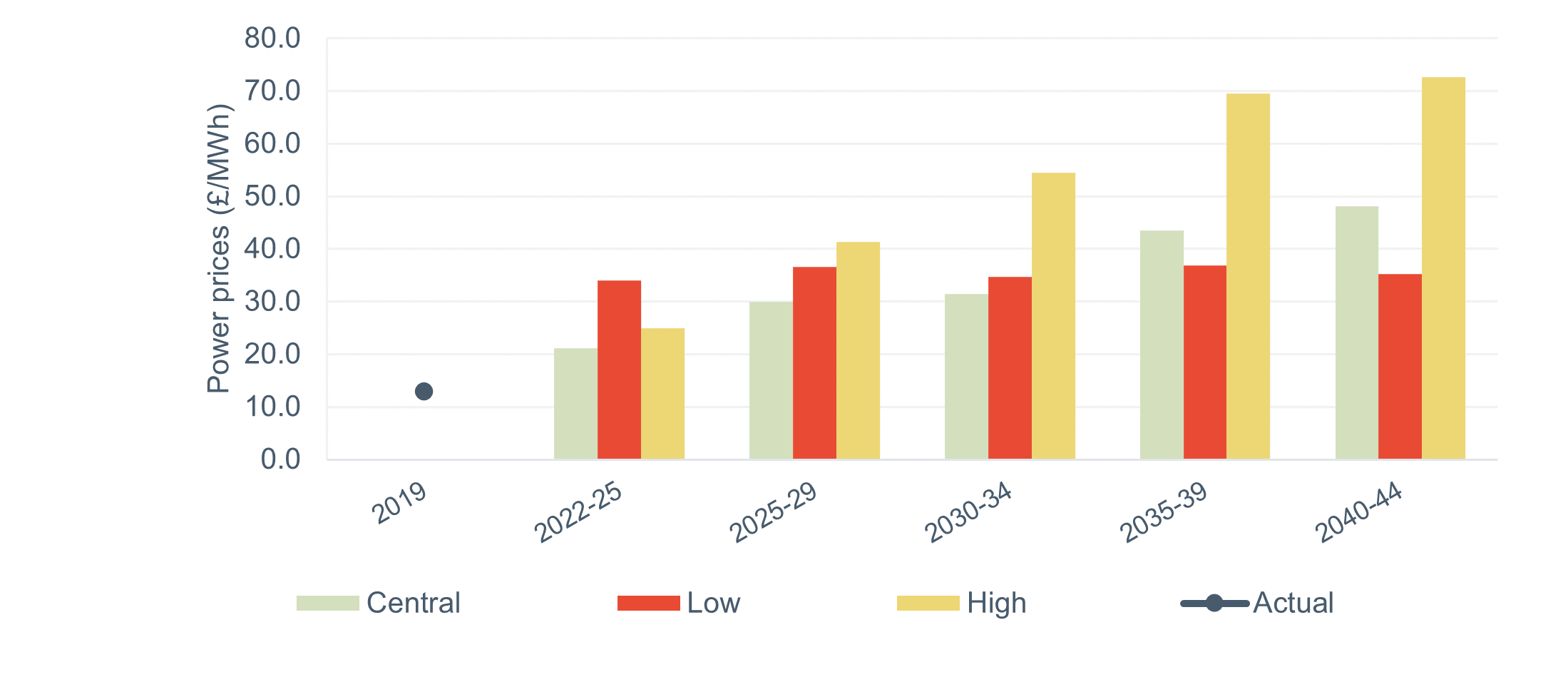The report ‘UK and the energy transition: Leading the way?’ analysed different markets including solar PV, onshore wind, offshore wind, low-carbon hydrogen and carbon capture utilisation and storage (CCUS), and storage. It showed that the UK government, while in a good position to become a global leader in decarbonising its economy, must tackle a number of key problem areas if it doesn’t want to miss targets.
This includes strengthening domestic supply chains to boost economic growth and engaging with local communities to roll-out renewable technologies such as onshore wind and solar. Crucially, the UK also needs to exploit first mover advantage for low-carbon hydrogen and CCUS by providing clarity on business friendly models for new technologies, hence allowing industries and investors to make appropriate investment decisions. Focus needs to be given to research and development to support domestic manufacturing and workforce.
Ever increasing power prices forecasted up to 2044 underline the need to build confidence for investment in renewable energy and deliver a stable and secure energy future.
Figure 1: Forecasted UK power prices, 2019-2044

Areas the report outlined needed to be looked at were:
• Ringfencing the crisis of energy suppliers: the UK government should support businesses struggling as a result of the energy crisis, demonstrating they recognise the complexity of investment and risk taking in the energy sector and help to rebuild confidence.
• Boosting international coordination and developing partnerships internationally: a more coordinated policy particularly between the US, the UK and the EU would enable these countries to tackle current threats to energy supply. The wealth of knowledge across hydrogen, Co2 storage and other developing energy areas can be shared to develop technologies across the globe.
• Streamlining the consenting process for renewables: The simplification of the offshore wind planning processes in the Energy Security Strategy, reducing consenting time from up to four years down to one year, represents an important step towards a more streamlined market. However, onshore wind received less attention with limited detail and less ambitious proposals.
• Maximising grid efficiency: There is a need for more holistic joined-up thinking to maximise the efficiency of the grid, particularly with regard to offshore wind.
Naomi Potter, Lead Research Analyst at Cornwall Insight, said:
"This research explores the advantages the UK holds as it pushes forward with the decarbonisation of its economy in the coming decades. The UK is already a global offshore wind leader, has some clear competitive advantages in the development of floating technologies at scale, and is paving the way to utility-scale low carbon hydrogen and CCUS.
“There are critical challenges facing the country as it pushes forward with its decarbonisation ambitions. These challenges are not insurmountable, however, and building on its strong foundations, the country can make significant strides towards environmental sustainability and energy independence, while unlocking investment opportunities."
Richard Cockburn, Head of Energy at Womble Bond Dickinson, said:
“Throughout the research period for this report, new variables continued to be thrown into the mix. The impact of the invasion of Ukraine, gas supply concerns and new legislation and political strategies were just some of the developments, which are typical of the pace at which the energy landscape changes. It’s tricky making decisions in an environment which is constantly in flux – which is why this data and insight will hopefully be invaluable for a market currently in a period of change.
“The report takes a global view, and the research has made it increasingly clear that the journey to net zero must be a collaborative one. Whilst the UK is well placed to take the lead in many areas of transition, the right policies need to be in place to make this a reality.
“The UK is a world leader in areas such as offshore wind - where the UK successfully ran its Offshore Wind Leasing Round 4 and its ScotWind process, which together could create up to an additional 33GW of offshore wind capacity.”